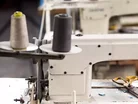IBM: Sustainable Fashion & Textile Supply Chain Optimisation

Sustainability, Profitability, and Transparency: The Future for the UK Fashion and Textile Supply Chain
In collaboration with the UK Fashion & Textile Association (UKFT), Tech Data, and the Future Fashion Factory, IBM is working to design, prototype and pilot a new technology platform based on its own technologies to drive sustainability, profitability and transparency in the UK fashion and textile supply chain.
Aside from the four collaborators, Next, H&M, N Brown, New Look and Laxtons will partake in the initial pilot.
“Working together, we are pleased to support the development of a new supply chain platform tool for the apparel and textiles sector, to facilitate the gathering of robust sustainability data and provide clear visibility of environmental and ethical impacts to empower better decisions,” said Joanne Poynor, Head of Sustainable Development at Next.
“We are delighted to be taking part in the UKFT SSCO Project as part of New Look’s core strategic commitment to integrate sustainable practices across the business. We recognise that collaborating on this project will help remove complexity, increase transparency and help develop sustainable solutions with more reassuring visibility of the people and the environments impacted throughout the value chain. We anticipate that by bringing new technologies and global networks together, UKFT will accelerate change and allow the provenance of the products we sell to open up from origin to end user,” added Sue Fairley, Head of Sourcing, Sustainability and Quality at New Look.
The Global Fashion Industry
Commenting on the fashion industry, IBM highlights that it is “one of the biggest global polluters and one of the greatest producers of waste, while issues around unsafe workplaces, labour abuses and low wages continue.”
“There's debate whether it's the third, fourth or fifth most polluting industry, but it's generally well known that about 4% of global carbon emissions and about 20% of water pollution comes from the fashion supply chain. So obviously it’s massive. On the US side, we dispose of about 70 pounds, which is about 30 to 32 kilogrammes clothes every year. So it's a growing impact that has dramatically started impacting the world,” said Sara Swenson, Global Senior Manager Sustainability at Avery Dennison in the August issue of Supply Chain Digital.
But one of the major obstacles preventing organisations from implementing more sustainable and responsible practices, and preventing consumers to be more sustainable is the lack of transparency and visibility across different stages in the supply chain.
“Data is siloed, systems tend to operate in isolation and parties have had little to no incentive to share data with the rest of the ecosystem due to the significant manual effort,” added IBM.
The Project
Awarded £1.4mn in funding by Innovate UK - part of UK Research and Innovation, on behalf of the Industrial Strategy Challenge Fund (ISCF) Manufacturing Made Smarter Challenge - the new technology platform will combine emerging technologies (blockchain, AI, and sensors) to digitise the key processes of the supply chain.
In doing so the project aims to create a shared system of data that different parties can trust and easily act on. “For example, it will be possible to gain a much better understanding of where and how each garment’s fabric was processed and finished, by whom and in what conditions. It will be easier to spot potential disruptions before they have a chance to affect delivery. It will also be possible to better monitor production processes and flows resulting in a real chance to reduce waste and optimise stock,” highlights IBM.
This level of insight will allow real, measurable, and auditable actions across the entire supply chain, and enable increased understanding of and compliance with the UN’s Sustainable Development Goals (SDG), and improve operational efficiency. “In essence, the platform will be designed to help make a complex and disjointed global supply chain more sustainable, resilient and able to cope with unforeseen disruptions," states IBM.
“We are delighted to offer our experience in supply chain management and technology platforms, our expertise in new technologies such as IoT, artificial intelligence, and data analytics, and our deep relationships with retail ecosystem partners to this exciting project. Our team is looking forward to working with the consortium to develop and deliver a sustainable, transparent and efficient solution for the UK fashion and textiles industry,” said Neil Cornish, Business Manager, Ecosystems Programme UK, Tech Data
- The University Manufacturing Circuit Boards from LeavesSustainability & ESG
- Schneider Electric's Commitment to Sustainable ManufacturingSustainability & ESG
- Lenovo & Saudi Alat Building Green Manufacturing FacilitySustainability & ESG
- Nissan Brings Biodiversity to the Factory through RewildingSustainability & ESG

